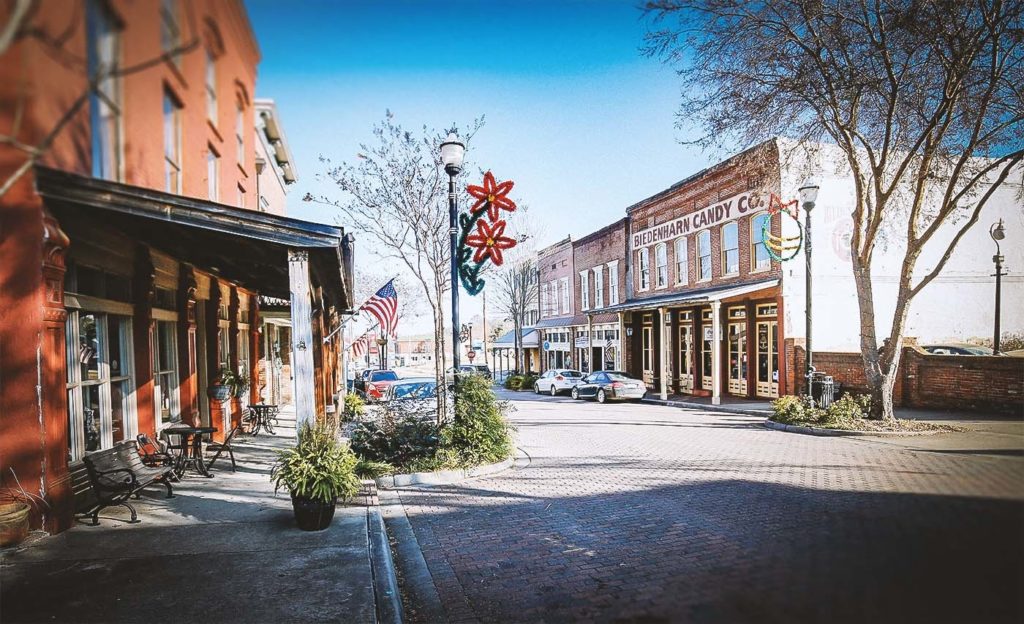Vicksburg: Adi and I were excited. For the second consecutive year, we were heading to Bald Head Island to lead a yoga and meditation retreat for Lighthouse Film Company that is based in Wilmington, NC. Incidentally, our friends Brad and Andrea Walker own LFC and Brad and I go back many years when we worked on a couple of short films that I wrote and directed while Brad was the cinematographer on the production.
Brad and I speak the same film language—“dolphin squeals”—this is how people describe our language. We bonded early on in our friendship talking about our favorite films which included Good Fellas, Butch Cassidy and the Sundance Kid, The 400 Blows, and many others. Brad has continued in the film business and carved out a rich career as a filmmaker and built a film production company in the process. Together, Brad, Andrea, Adi and I have formed a beautiful friendship where we share the triumphs and setbacks of life together and offer support and encouragement during all stages of life.
For the moment, Adi and I were about to embark on this second annual cross-country trip to Wilmington. We would split the 16-hour drive into three days to give us time to see the country at our pace which is almost always leisurely. We would start from Texas and travel through the cradle of the Civil War (as Paul Simon once so famously called it) with our first stop in Vicksburg, MS.
Vicksburg: The Nail Head
I know what you may be thinking: Vicksburg? Civil War Vicksburg? The city had never really been on my radar before, but it just so happened to be an almost perfect 6 hour-stop from our original destination which suited our travel plans perfectly. Like in the Civil War, Vicksburg found itself smack dab in the middle of plans it never really had any say in how or why those plans were being executed. I would come to learn that Vicksburg, Mississippi is a city with a rich history and a unique southern charm.

As forementioned, it was known for its pivotal role in the American Civil War. It’s hard to underestimate the historical significance of Vicksburg. Some may say it was the fulcrum of the war where Vicksburg was a major strategic location, controlling access to the Mississippi River. Both Jefferson Davis and Abraham Lincoln were known to have said, “As Vicksburg goes, so goes the war,” because of the critical importance of the Mississippi River.
Control of the Mississippi River was vital for both the North and South to move troops, supplies, and resources, and whoever controlled Vicksburg would have a significant advantage in the war. During the Vicksburg campaign, Jefferson Davis personally visited the city to oversee its defense and provide support to the Confederate forces. Despite the heavy casualties and constant pressure from Union forces, Davis continued to believe that Vicksburg was worth defending, stating that the city was “the nail head that holds the South’s two halves together.”
The fall of Vicksburg to Union forces on July 4, 1863, was a significant victory for the Union and a turning point in the war. It gave the Union control of the Mississippi River, split the Confederacy in two, and boosted morale among Union troops and supporters.
In a letter to General Ulysses S. Grant, Abraham Lincoln wrote, “My dear General, I do not remember that you and I ever met personally. I write this now as a grateful acknowledgment for the almost inestimable service you have done the country. I wish to say a word further. When you first reached the vicinity of Vicksburg, I thought you should do what you finally did—march the troops across the neck, run the batteries with the transports, and thus go below; and I never had any faith, except a general hope that you knew better than I, that the Yazoo Pass expedition and the like could succeed. When you got below and took Port Gibson, Grand Gulf, and vicinity, I thought you should go down the river and join General Banks, and when you turned northward, east of the Big Black, I feared it was a mistake. I now wish to make the personal acknowledgment that you were right and I was wrong.”
This illustrated the importance of Vicksburg during the war. The city still carries this feeling of importance with it as it has moved into modern times. You can’t help but feel it’s rather complicated past ooze out of the pores of the city. One step inside a few of the restored buildings of Vicksburg and it feels as if you have been teleported, via a time machine, to a far simpler yet more complicated time in history.
The relics of the city’s past history with slavery linger around every corner, and yet the city does its best to gently move itself forward to a new way of being. At points during our very short stay in Vicksburg, I couldn’t help but feel as if I had been transported into Mark Twain’s The Adventures of Huckleberry Finn, which eloquently explores and critiques the social and moral values of its time, particularly through its portrayal of race and racism in America.
I didn’t really know what to expect when Adi and I arrived in Vicksburg. Adi, who is forever a trip researcher, booked us a stay at Oak Hall or what is better knowns as the Fannie Vick Willis Johnson Home. Just stepping foot inside this museum of the home made me feel as if I was stepping back in time. We were greeted by the owner, Elizabeth Nelson, who was an absolutely delightful host who made us feel immediately at home. She gave us a brief history of the home.

The Fannie Vick Willis Johnson Home is also known as Stained Glass Manor and Oak Hall Bed and Breakfast — or, if you’re an old-school Vicksburger, it’s got an entirely different name altogether—people from the area call it “The Old Ladies’ Home,” because it used to be used as the protestant widow’s home.”This home was built in 1911 as a “city home” for Fannie and her husband, Julius, when they weren’t staying at Panther Burn Plantation, which Fannie, a relative of Vicksburg’s forefather, Newitt Vick, inherited from her parents. Junius died in 1919 when a tornado hit Panther Burn and the big house collapsed and crushed him. Fannie sold the plantation for $1 million and lived on the Drummond Street property full-time.
Learn more about Oak Hall in Vicksburg!
Most notably in her lifetime of philanthropic contributions, Johnson used part of her fortune to build Black and white YMCA buildings in her husband’s name — a total contribution of more than half a million dollars.
Johnson also had a soft spot for those who were orphaned or widowed. In 1930, a year before her death, she deeded the Duff Green Mansion as a memorial for a protestant boys’ home. After her death, with an endowment from her estate, the home was known as the Fannie Willis Johnson Protestant and Ladies Home. The home operated until 1966.
The home is now owned by Elizabeth and Don Nelson, and they operate it as a BnB, renting out the large bedrooms for the night to travelers passing through. Adi and I slipped back more than 100 years in time as we entered our ornate “state room” and settled in after a long drive.
As the sun was beginning to set below the horizon, closing out another day in Vicksburg, Adi and I decided to grab a bite to eat. Mondays are not the ideal day to dine out in Vicksburg; many of the restaurants are closed befuddling even some locals.
“A lot of restaurants don’t open on Mondays and Tuesdays,” Elizabeth told us begging the question, do the folks of Vicksburg fast on these two days? Or maybe they are required to cook their own meals on these two days? Either way, Adi was back to her research and after some help from a very kind local named, Kevin, who noticed we were in a quandary as to where to eat, suggested Walnut Hills.
Read More Adventures of Adi and David
Almost all of Vicksburg is like stepping back in time and dining at Walnut Hills was no exception to the rule. The restaurant is housed in a beautiful old home with high ceilings, elegant furnishings, and plenty of charm. While we ate we listened to nearby conversations as locals discussed the goings on in the city and we were given a sneak peak at the rumors and speculations regarding city politics. It felt like we were flies on the wall getting a clandestine look at the inner workings of the thoughts of the people of Vicksburg.
After a night of sleep, Adi and I hopped back on the road to head to Augusta, GA on the way to our final destination, Bald Head Island, NC for our yoga and meditation retreat.
As we left Vicksburg, I felt as if I left a city that seemed seeped in a past that was trying to reconcile its own history. At one time this old southern city was the turning point for a war that turned brother against brother, friend against friend, American against American, in a battle for our country’s ideals and beliefs. I’m not so sure this battle is over and in fact may have changed only in tenor, but a battle raging on nonetheless.
The battle now seems more economic—rich against poor—the haves versus the have nots—those that are served and those that serve—either way the battle goes on and we are left to decide: Who are we as a people? What do we hope to make of this American Democracy? What exactly is the “American Dream?” These crossroads are before us and it is up to us to decide: What will our great-grandchildren say about our generation and what we left for them?
It’s all up to us now…

